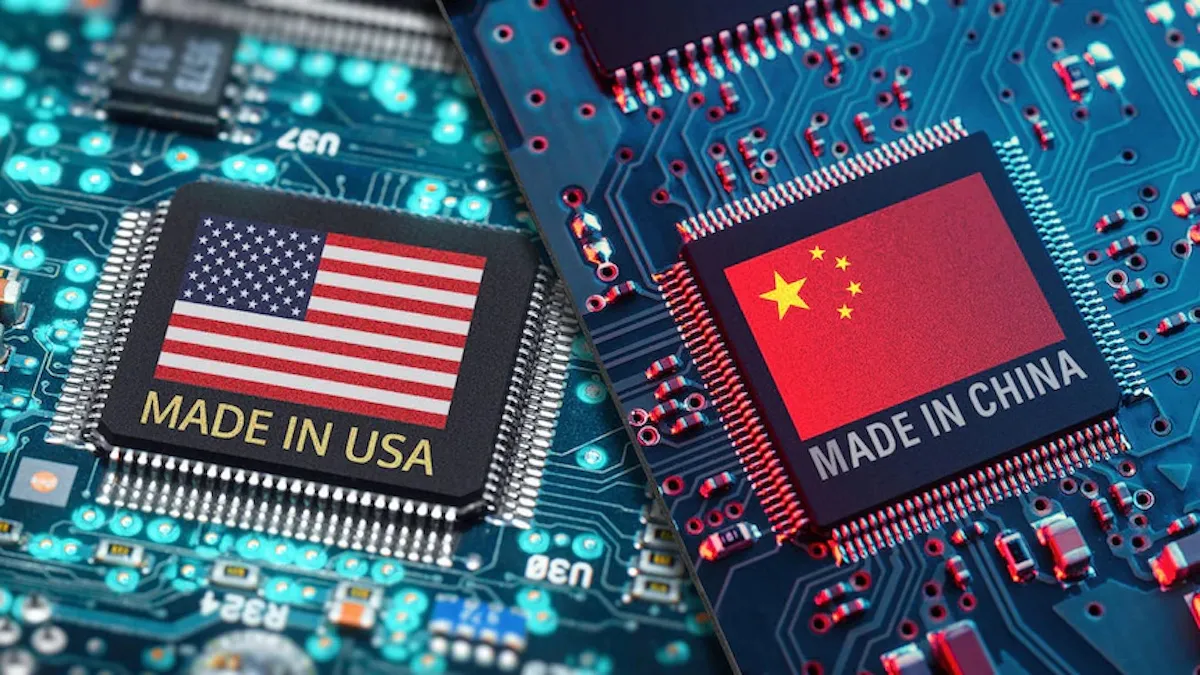When production and supply of semiconductors or chips were stopped due to demand and supply side shock during the Covid-19 pandemic, the Sino-US technological conflict accelerated to a new level. It further deteriorated when the CHIPS & Science Act, a $52.7bn industrial strategy to support research and revive chip manufacturing in the US, was approved by the Biden Administration in August 2022. The US even moved ahead with restricting the sale of advanced chips to China after August 2022 to prevent it from gaining skills to fuel its AI. Such a slew of restrictions imposed on China by the US were firmly grounded in the belief that China's technological prowess would eventually undermine US national security because the Chinese government might jeopardize crucial data.
In 1990, the US used to produce 37 percent of the world’s chips; by 2021, that percentage had dramatically dropped to 12 percent. The rising Asian nations benefited from the participatory globalization that the US once initiated when all of its jobs were exported abroad. Global companies are the drivers of globalization, and tech businesses are becoming the point at which nations clash. As an illustration, consider Taiwan Semiconductor Manufacturing Company (TSMC), which produces 58.5 percent of the semiconductors in the world. Samsung comes in second with 15.8 percent of the market. Because of this, China and the US have suddenly established a zone of control over Taiwan to gain access to the most important technology in the world. China's chances of winning this chip war decreases as Taiwan advances further toward the US and ties with China deteriorate. In line with this, TSMC had already announced the opening of the company’s second chip plant in Arizona,US with raising its investment from $12bn to $40bn. So, as long as Taiwan moves closer to the US, the intensity of the tech war heats up. Path ahead The Sino-US geo-technological conflict has centered on the technological products created by the two countries over the last few years. During the 2016 US presidential election, potential 'Russian-backed' forces promoted materials on Facebook to the TikTok data security mechanism, where the Chinese app is accused of accessing Americans' data for the Chinese government's covert operations. From the Hi5 era to Facebook and Tiktok, and now to the rise of the Metaverse, the safety and protection of public vital data has taken a blended form of a country's national security and personal liberty spectrum. Rights-based organizations in the Western nations are demonstrating for full data security and privacy against the military industry, which has opposing views on the issue. For the military-industrial complex, any regular critical comments by citizens can be suspicious. For liberal business users, it can be just expressing one’s views. As a result of the mix of suspicious viewpoints and hard edge weapons, conflict is blown up. Sometimes such points of view lack cross-checking and result in catastrophe. The US's Iraq disaster story with nuclear weapons disinformation is a prominent illustration. The US and China both wanted to profit from chip manufacturing while also having access to the data of each other’s nation to devise defense strategy. At the same time, both countries sought to safeguard their public information. For the United States, maintaining its dominance is a critical concern, and China’s effort to undermine it is the new normal. This is the Thucydides Trap, which is completely founded on technological adventurism (previous Thucydides Trap was on territory). Within the United States, there is a schism between corporate interests and national security supporters, which has different views on developing unified policies that have both national security characteristics as well as a business flourishing process with its competitors. Despite the fact that China is the leader in global supplies, disruption with it could harm the US economy. On the basis of harmonious ties itself, the US already has a larger trade imbalance with China ($382.9bn, 2022). Politicians from Nepal to India, and from the United States to the United Kingdom, are experts at inventing an ‘enemy’ and enacting anti-policy. US lawmakers are also under duress to enact harsh anti-China policies. Republicans have been more outspoken in their resistance to China than Democrats. Of course, Biden earlier considered “Competition and Collaboration (2C)” with China, but due to China's growing influence, he was pressed to formulate many policies against China. Although the US economy is resilient, rivalry with China comes at a certain and significant expense. This has caused the entire policymaking and business groups in the United States to rethink whether the country wants to totally disengage with China on entire frontiers, thereby constructing a new global economic ecosystem. Are all of the US' European allies ready for creating a newer global structure countering China? At a moment when Europe is gripped by conflict and Eastern Europe’s bad economic performance, China's footprints are difficult to ignore. Engaging with China and keeping all important information-intensive sectors tightly controlled by the government so that theft of public information is not feasible. That can be an option. In addition, technological conflicts have once again highlighted the importance of ‘protectionism’ over the free market. Are we returning to protectionism at the expense of national security interests, in which the US has spent heavily? Public liberty versus national security is a hotly discussed subject with opposing viewpoints in the contemporary world. At last, there is no one-line answer to the Sino-US technological conflict because conflicts are intended to create superiority over others. One thing is certain: Great powers’ global tech adventurism will have many proxies in vulnerable countries like ours. It is tough to escape.











